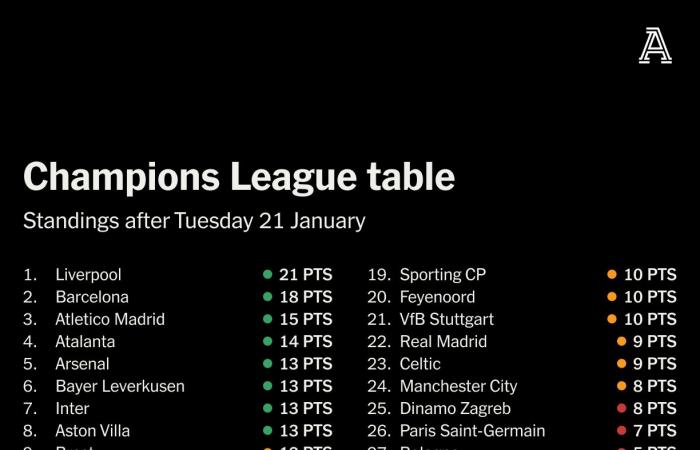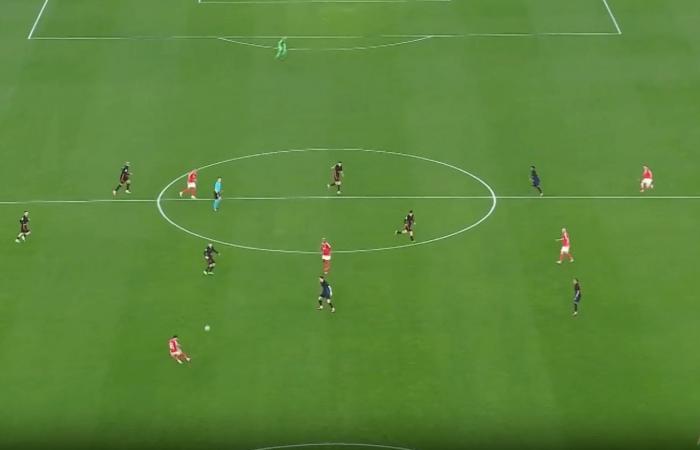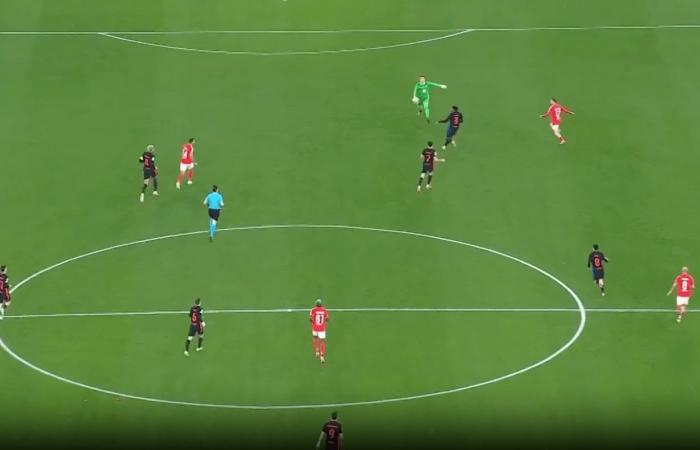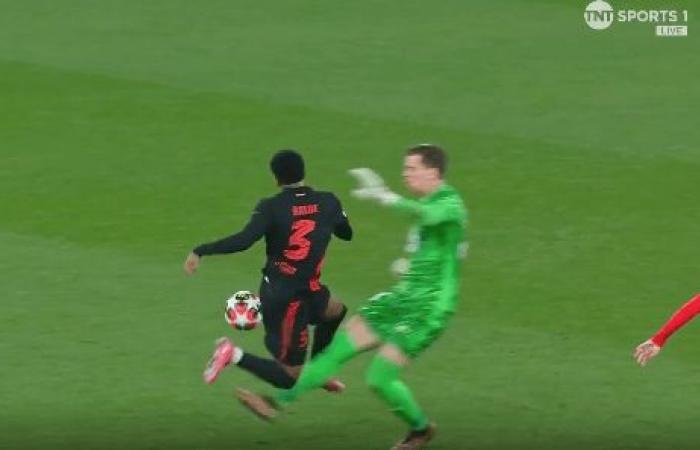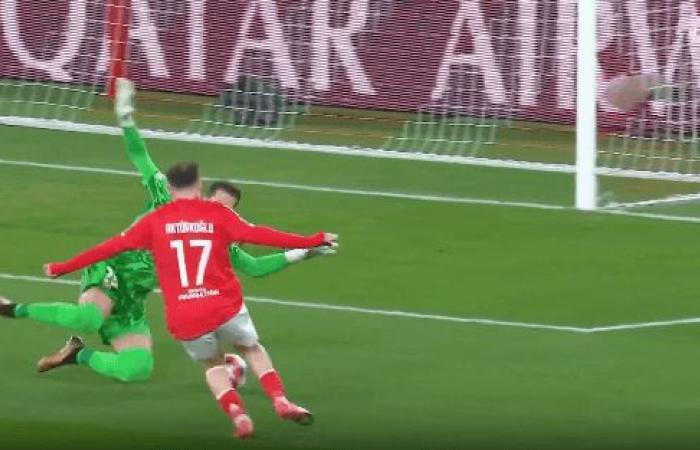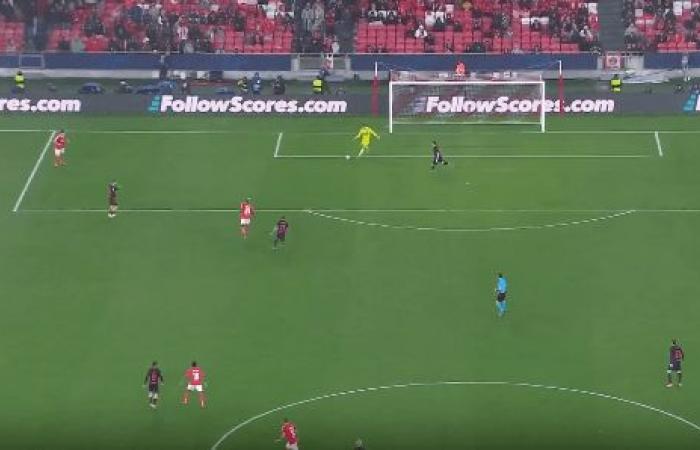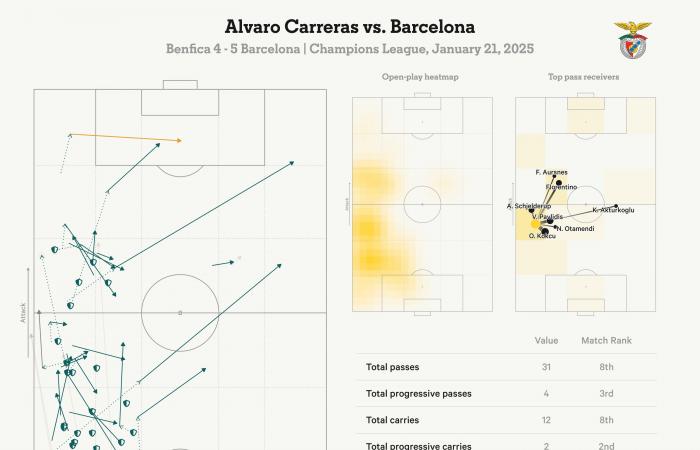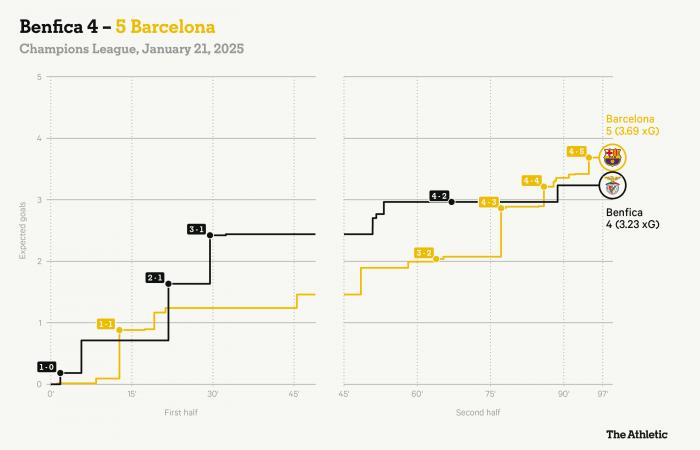Raphinha scored a late and controversial winner as Barcelona came from behind to win a remarkable game 5-4 against Benfica and qualify for the knockout stage of the Champions League.
The last-minute goal was allowed to stand despite Benfica claiming they should have had a penalty moments before as Barca took all three points.
In an amazing game, the first half had almost everything, with an early goal from Benfica cancelled out by a Robert Lewandowski penalty before Wojciech Szczesny came to the party.
First, the 34-year-old goalkeeper clattered his own player, Alejandro Balde, leaving Vangelis Pavlidis free to get his second before the Pole then conceded a penalty allowing Pavlidis to complete his hat-trick.
The second half had a go at competing with the first and brought an odd finish from Raphinha, an own goal from Ronald Araujo and a second penalty from Lewandowski. Eric Garcia added a late equaliser before Raphinha’s winner.
Jack Lang and Mark Carey break down the action from a ridiculous encounter at Estadio da Luz.
That ending…
This match was ludicrous in about 700 different ways, but the final act took the biscuit.
Benfica had a free kick, deep into injury time, rain lashing down, energy levels touching zero. Angel Di Maria swung it into the Benfica box, starting an almighty scramble.
Nicolas Otamendi thought he should have had a penalty when he tangled with Andreas Christensen, but there was nothing doing. But when Leandro Barreiro went down a second later, challenged by Fermin Lopez, it seemed inevitable that referee Danny Makkelie’s whistle would blow. It didn’t. As Benfica’s players protested wildly — on the field and on the sidelines — Ferran Torres hacked a long ball forward to Raphinha. The Brazilian still had plenty to do but ducked inside his man to drill home a dizzying, laugh-out-loud goal.
Benfica continued to protest, expecting a VAR intervention. It never came. It was about the only thing this game did not have.
Jack Lang
Szczesny’s moments of madness — and why did he start?
Alejandro Balde squirmed on the floor, winded but also, presumably, just deeply confused. He was not the only one. Nine of his Barcelona team-mates just stood there, wincing and grimacing. In the space of about three seconds, a match that had been well under control had just dissolved in front of their eyes, leaving behind a scene of utter devastation.
You didn’t need a doctorate in body language to know what they were all thinking. What the hell just happened?
The answer? Szczesny had just happened.
We should skip back a bit here — to the start of October, when Szczesny made an unexpected return to the top table of European Football. The former Arsenal and Juventus goalkeeper had retired at the end of the 2023-24 season, despite only being 34. But when Barcelona lost first-choice goalkeeper Marc-Andre ter Stegen to a serious injury, they managed to talk Szczesny into one last big job, heist-movie style.
For most of the season, that job has involved sitting on the bench and watching Inaki Pena — Barca’s other goalkeeper — prove his credentials. Szczesny got a charity Copa del Rey start before Christmas, then played in the Spanish Super Cup, partly because Pena had annoyed manager Hansi Flick with poor timekeeping. The Pole’s red card in the 5-2 win over Real Madrid, though, seemed to restore Pena back in the top of the pecking order.
There were a few eyebrows raised, then, when Szczesny got the nod on Tuesday night. And within half an hour, the logic of the decision had been fractured into tiny little pieces on the Estadio da Luz turf…
The score was 1-1 when Nicolas Otamendi pinged a long diagonal pass into the space behind Balde and Pau Cubarsi…
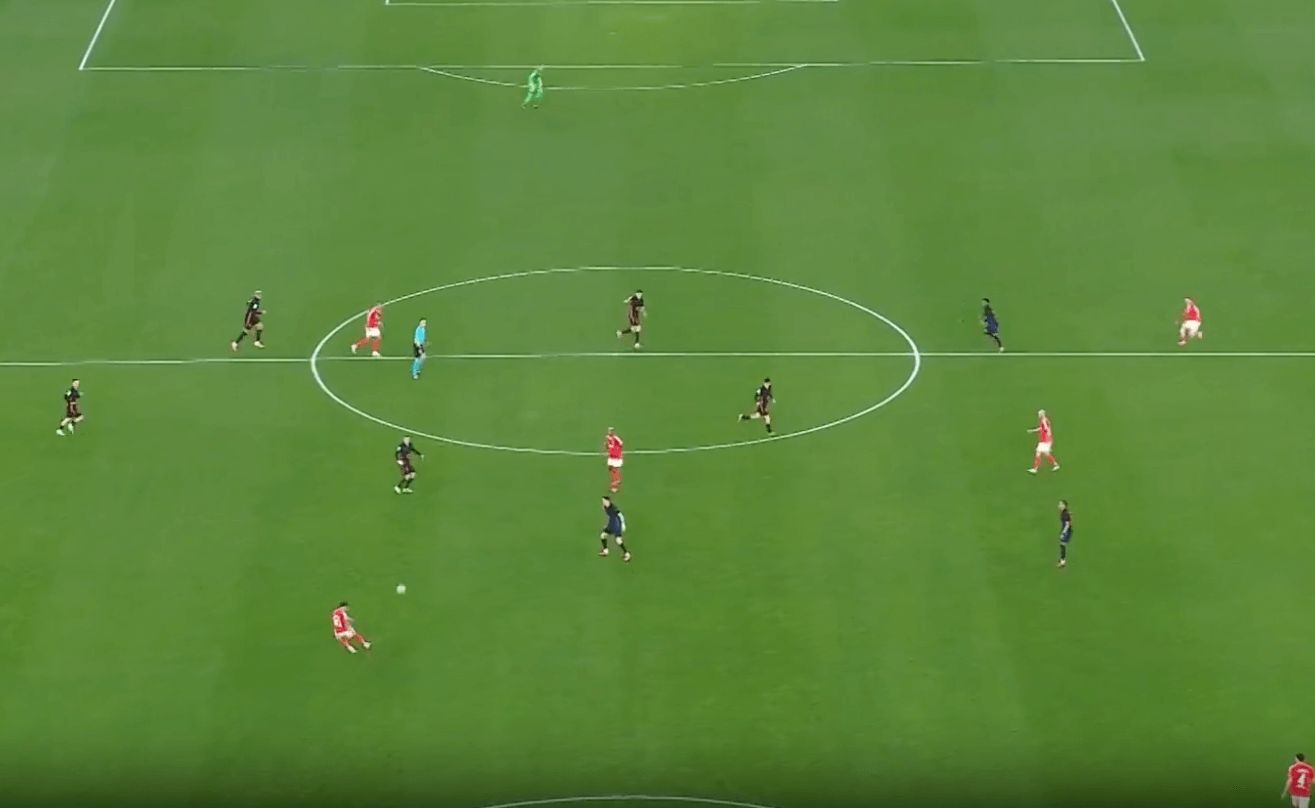
It was a decent enough ball, but the defenders appeared to have the situation under control. But then came Szczesny, a streak of green, out of his goal — miles from his goal, years from it, gone so long that the citizens of his goal had written him off for dead — and straight into Balde. THWACK.
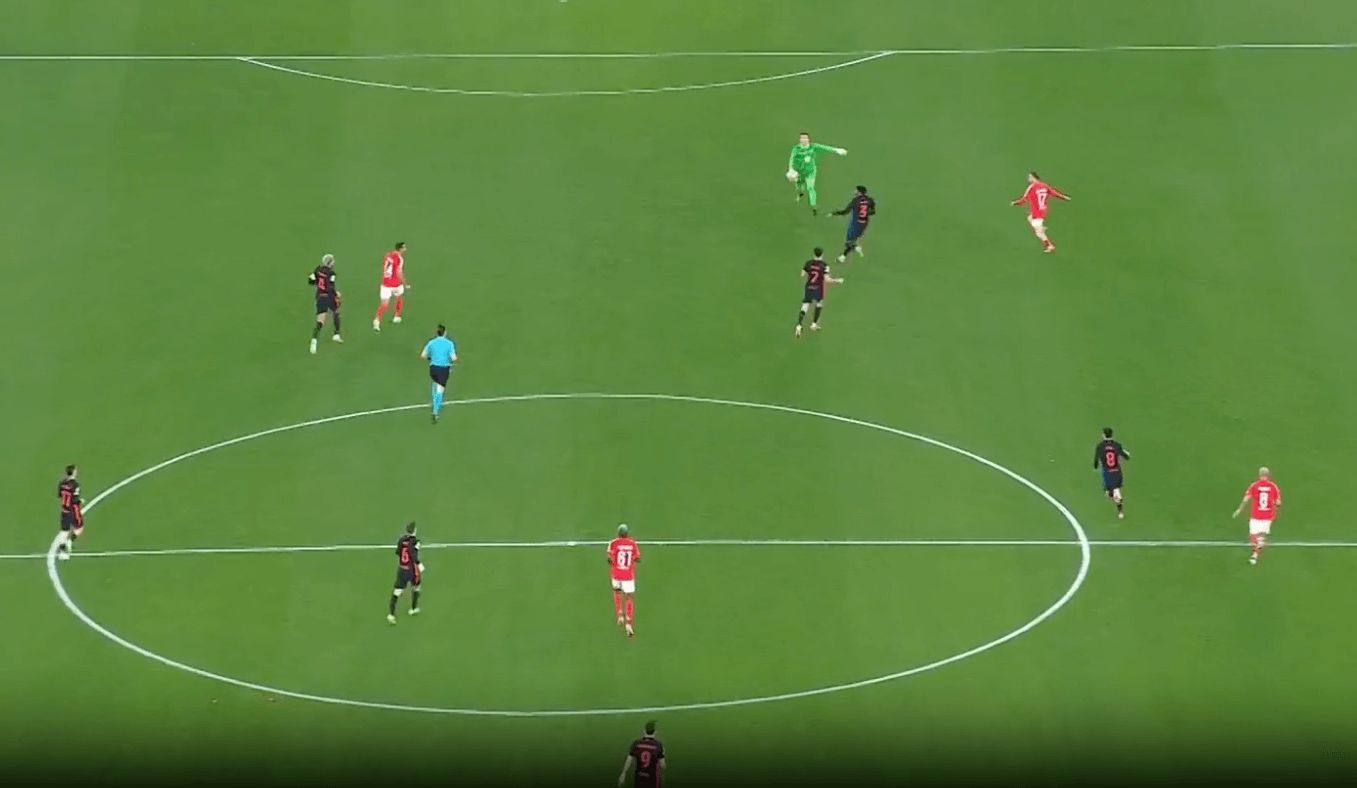
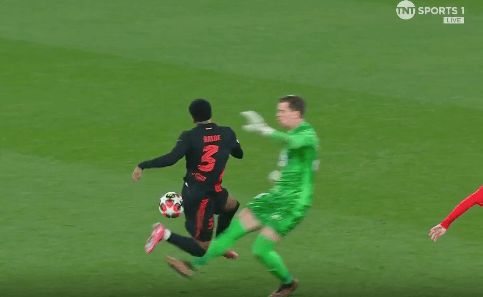
It was a startling impact, the kind that initially made it hard to appreciate the obvious comic value of what had just occurred. Both men were laid out long after Pavlidis had run the ball into an empty net, giving Benfica a lead they would only relinquish in the dying stages.
Eventually, they both got up and played on. Szczesny’s bruised ego, though, would have to endure another blow a few moments later, when he upended Kerem Akturkoglu, conceding a penalty.
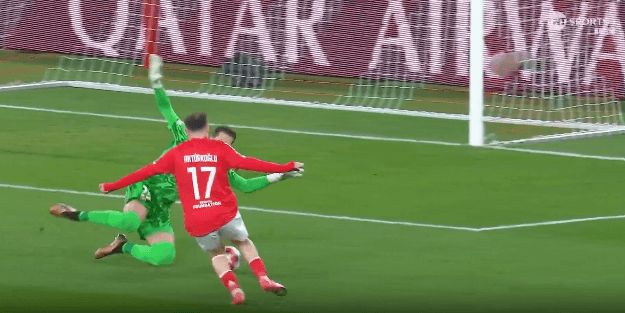
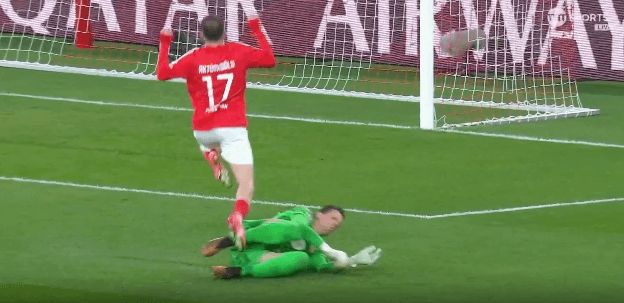
A chastening evening, for Barcelona, then, and for Flick. You’d have to imagine that Szczesny was more late to those two challenges than Pena was to any meeting.
Szczesny did restore some pride in the final minute, saving smartly from Di Maria with the score at 4-4, but you’d imagine Flick will think very carefully about starting him in further games.
Jack Lang
-Did Raphinha mean that?
Barely a week goes by without some team or another giving the ball away while trying to play out from the back, conceding a goal that would, a couple of decades ago, had people laughing and/or wringing their hands for weeks. Football changes. Weird gimme goals? Yes, sure, we’ll take ’em.
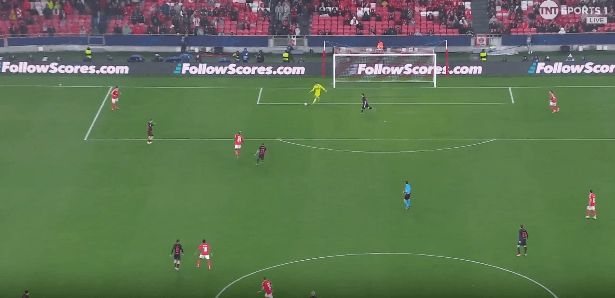
Still, it’s always nice to get a few new variations on the theme. Before Tuesday night, I had never seen a goalkeeper wallop a ball straight onto the forehead of an attacker and watch the ball balloon back into the net.
Now, thanks to Anatolii Trubin and Raphinha, I have. Thanks!
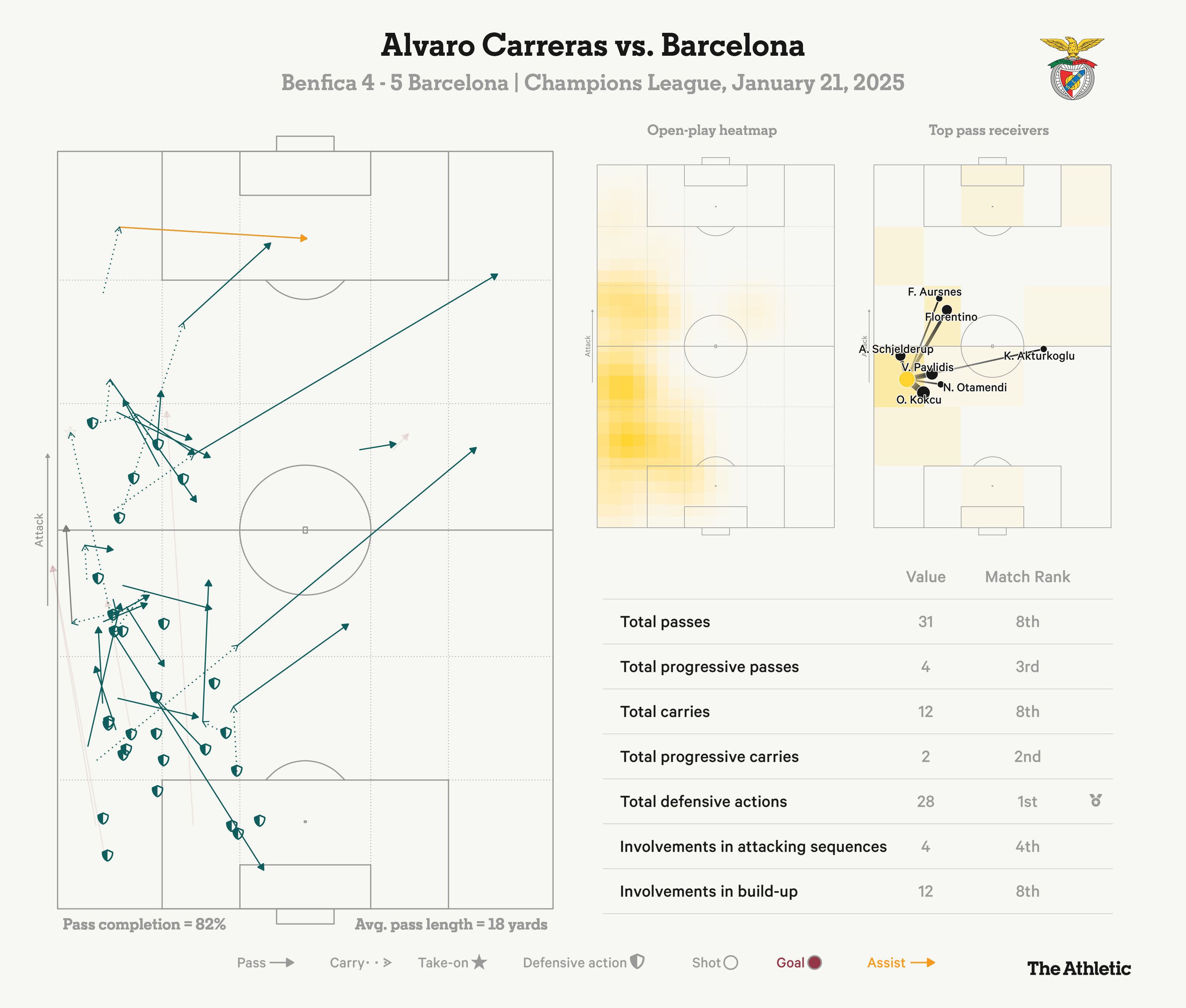
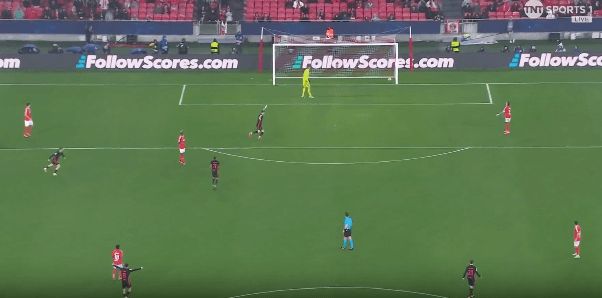
Jack Lang
How Benfica tried to skewer Barcelona
The best method to unlock Flick’s Barcelona side? Look to expose their high line.
This is not new information by now. Flick’s approach has largely been successful this season, but many clubs — including those in the Champions League — have had success with deep third-man runs and well-timed diagonals to circumnavigate Barcelona’s offside trap.
Within three minutes, Benfica did exactly that. A diagonal ball from Tomas Araujo found Alvaro Carreras in oceans of space to cross first time for Pavlidis to finish.

While Benfica’s second goal looked more calamitous from a Barcelona perspective — as Szczesny skewered team-mate Balde after a communication breakdown — the credit must also go to Benfica, who skewered Barcelona’s back line with the ball played over the top.
It was painfully simple at times. When there is little pressure on the ball with space to exploit in behind, such looped passes are not only enticing but actually straightforward to play at the elite level. The fact that 22 per cent of Benfica’s passes were long — comfortably their highest rate in the Champions League this season — shows just how much they accepted Barcelona’s offer to play more directly.
Despite such a late, dramatic loss in the pouring rain, Benfica’s attacking approach did ask questions of Barcelona’s back line. Flick will be aware of the fallibility of such an approach in the knockout stages.
Mark Carey
Keeping Yamal quiet, by Alvaro Carreras
Few people would have batted an eyelid to hear that a young Spanish star provided a standout performance in Barcelona’s clash with Benfica.
The more shocking revelation was that the player in question was Benfica left-back Alvaro Carreras. The 21-year-old was excellent going forward, hugging the touchline to receive in space against Barcelona’s narrow back line — delivering sumptuous crosses for his team-mates to attack.
An assist for Pavlidis set the tone, soon followed by a delicious dinked cross for Fredrik Aursnes in the opening stages. Even his front-footed interception was the catalyst for Benfica’s third goal which saw Kerem Akturkoglu earn the penalty after Szczesny’s foul (see above).

Defensively, Carreras was tasked with keeping the prodigious Lamine Yamal quiet, and stuck to his task excellently for long periods. With his head constantly swivelling to check where the teenager was positioned, Carreras was strong, quick, and aggressive throughout. The only blot on his record was conceding a, somewhat soft, penalty to Yamal in the final stages as the game descended into further chaos.
The irony of Carreras’s performance will not be lost on Manchester United fans. The 21-year-old spent four years at the club before departing in 2024 — via loans at Preston North End, Granada, and Benfica. Considering Ruben Amorim is short of an athletic left-footed wing-back to fit his style, it only adds salt in the wounds to hear that he had a player of Carreras’s profile already on the books within months of his arrival.
Throw in the fact that Carreras was schooled in the youth ranks of Barcelona’s bitter rivals, Real Madrid, and Tuesday’s performance would have been a special one for the 21-year-old — even if his side didn’t secure the victory.
Mark Carey
What did Hansi Flick say?
Speaking after the game, Flick said: “It’s been a crazy game. Benfica have been especially good in the first half. We have made several mistakes and they capitalised on them. I liked the mentality of my players. I liked what I saw in the second half. There is one game left next week but we are qualified and that’s great.”
On goalkeeper Szczesny, Flick said: “Before the game, we spoke with Szczesny on what we wanted. He has made some mistakes, but in the end, he’s saved us with a great stop to Di Maria. Every player has mistakes. We win and lose together. We don’t have a goalkeeper for every competition. We decide the best option when we prepare every game.”
What next for Barcelona?
Sunday, January 26: Valencia (H), La Liga, 8pm GMT, 3pm ET
Recommended reading
(Main photo: Patricia De Melo Moreira/AFP via Getty Images)


